Want to hear more from the actors and creators of your favorite shows and films? Subscribe to The Cinema Spot on YouTube for all of our upcoming interviews!
Lead Critic for the site, as well as serving as an editor when needed.
David Weil’s Prime Video television series, Hunters, premieres its second and final season on January 13th, this Friday. Audiences should feel slightly relieved with the finale Weil and his team have written. Hopefully, this will leave them satisfied by the end. Both seasons in general should be considered among the best offers Prime Video brings to the table as well.
A huge shoutout to Prime Video for allowing me to watch Hunters Season Two early. Also, stay tuned for my interviews with creator David Weil and several cast members.
This review will contain no spoilers for the main story of the second season of Hunters.
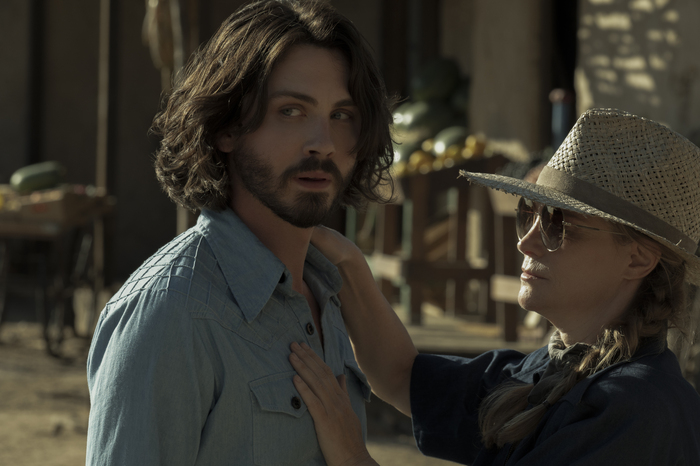
Plot Discussion
This season of Hunters is some of the best television I have ever seen. Season One blew me away, so my expectations were high going into the second and final season. There is a lot at play in Season Two, to say the least. The addition of flashbacks to 1976 through 1977 up until where Season One begins is a great addition to the already insane main plot: to find and capture Adolf Hitler (Udo Kier). These flashbacks are how Al Pacino was able to return to the show for Season Two as Meyer Offerman.
While I cannot reveal much, Jonah Heidelbaum (Logan Lerman) and his team do indeed finally capture Hitler. The moment between Jonah and Hitler when Jonah finally confronts the man responsible for eleven million deaths is very somber, and yet cathartic at the same time. The show also does a fine job of keeping the audience entertained without revealing too much when things get chaotic. The entire story is terrific, and while this is the final season of the show, Weil left it open just wide enough to continue the story.
On a side note, Season One was full of pop culture references to the time period in which it was set. This was one of my favorite aspects of the writing that is brought back in Season Two to great appeal. They are always in a great place within the dialogue, serving as mere foil, but it makes the story and its characters really feel alive. Overall, the writing is very solid.
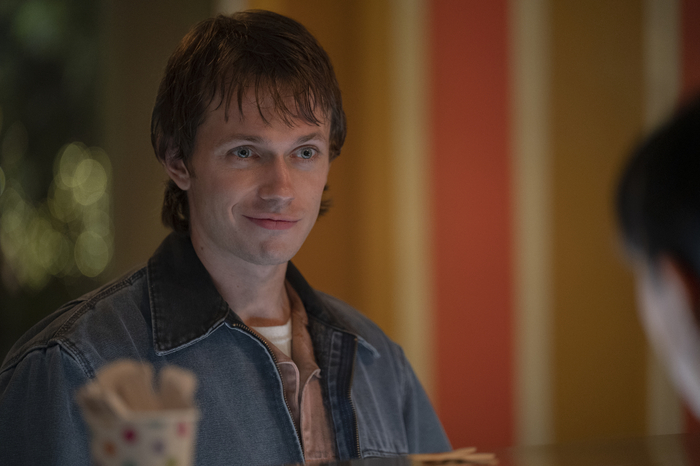
Character Development
Chava
The addition of Jennifer Jason Leigh as Chava Apfelbaum — Jonah’s great aunt and Ruth’s young sister — is fantastic as well. We learn Chava has been hunting Nazis for decades and wanted to “stay dead” instead of letting her sister know she survived the war. She felt the person she was had died and who she is now is more important. She somewhat prefers it this way. The character is ruthless and a bit cunning, only wanting the Nazis and their collaborators to pay, with death.
Opening the season in 1972 with Chava in Austria was a great decision. The sequence does a great job of presenting exactly the type of person Chava is: a ruthless Nazi hunter who wants the ultimate prize, Hitler.
Travis Leich
There are several characters that get much more screen time in this season as well. Travis Leich (Greg Austin) is more crafty and basically becomes Eva Braun’s (Lena Olin) right-hand man. My biggest complaint with him is that he sings fewer show tunes this time around. This was thoroughly entertaining in Season One. It is relevant to nothing, except that it would have been even funnier for it to continue in this season.
Regardless, Travis still creeps audiences the hell out and Austin’s portrayal is one of my favorite television villains. Although his fate is left super ambiguous, it would have been nice to get some kind of final scene with Travis. Still, there are no major complaints.
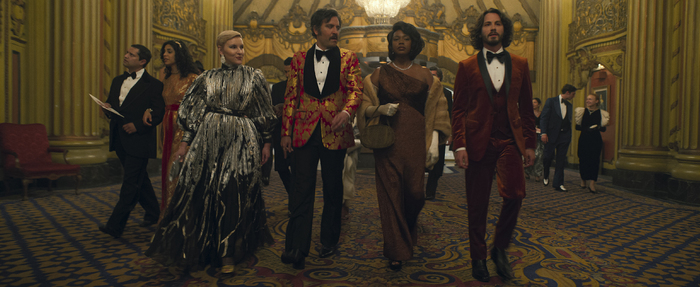
Millie Morris
Jerrika Hinton as Millie Morris is much better in Season Two than in the first season as well. The character has seemingly learned that, sometimes, the system does not work and you have to take matters into different hands. Ultimately, she makes a decision she reckons with all season. However, by the finale, she is at peace and comes to terms with everything that has happened.
We also learn that she is in a quiet relationship with Sister Harriet (Kate Mulvany). This is surprising but also works in some way. By the finale, both have found a way to move on. Harriet offers comfort that Millie had not had since her last relationship. For Harriet, I believe it gives her more to fight for and helps her begin a new phase of life after finding Hitler.
Jonah Heidelbaum
This is Logan Lerman’s best role of his career so far. In Season One, he matched wits with Al Pacino amazingly and was fantastic throughout. In Season Two, he dials it up to eleven and even compliments it with a nice new hairstyle and beard. By its finale, he seems finally at peace with his grandmother’s death in Season One but is also willing to continue The Hunt as long as he can, because as Harriet puts it, “Evil doesn’t rest Jonah, evil doesn’t retire, so why should we?” He has amazing wit and commands the screen when given the opportunity. This was arguably his show.
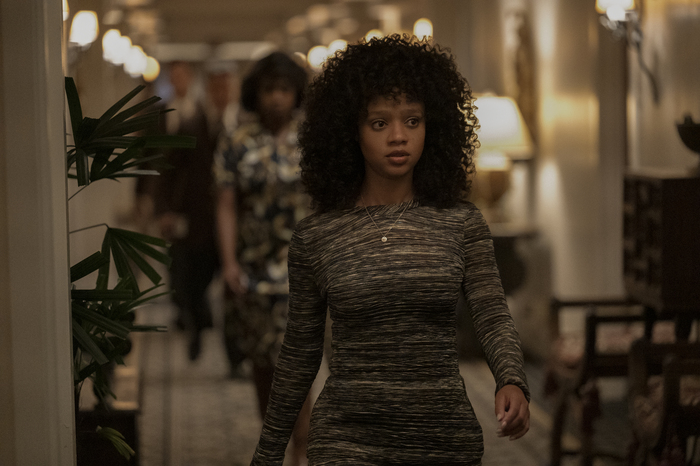
The Hunters
The moment when Joe Mizushima (Louis Ozawa) is finally confronted by Roxy Jones (Tiffany Boone) & Lonny Flash (Josh Radnor) is one of the season’s craziest moments. It also serves as a reminder that, at any time in their line of work, people can get seriously hurt, or die.
These three characters are awesome this season. Radnor has more opportunities to lash out, and he nails it just the same. It would have been nice to see him be a bit more of the smartass he was in Season One. Roxy, unfortunately, gets left out of the final battle, but is still present and wants to get the job done all the same. Boone has more time to shine here and even steals the room in a sequence after her injury confronting Joe. Moreover, Joe is much more complex. You can seriously feel his trauma and you can’t help but root for him to turn back over to the good guys’ side.
Along with that, Heidelbaum’s fiancée Clara (Emily Rudd), gets twisted into The Hunt. The Hunters end up side-tracking for her at one point.
Finally, it would have been nice to get more of Mindy Markowitz (Carol Kane) on the screen. Although, as she did in Season One, she has another great opportunity to make the audience feel the pain and loss of innocence felt within Holocaust survivors. She takes the stand in the season finale during Hitler’s trial, another gut-punching scene the show is memorable for.
Technical Aspects
The direction is great in Season Two, topping that of Season One. There are several one-shots throughout the season and a returning aspect is, perhaps, the best of the direction: comic book panel shots. It was present throughout much of Season One and returns here to much mass appeal. I love the way the directors make use of the camera and use it as a literal comic book panel. It is even Quentin Tarantino-esque, and it really makes the show stand out. The writing, as I have already stated, is fantastic and solid. It works all the way around and I loved where our characters ended their journeys.
The music by Rupert Gregson-Williams is outstanding as well. Gregson-Williams taking Cristobal Tapia de Veer‘s score and spinning it to make it a bit different is excellent and the music is rather phenomenal.
A New Look to Hunters
The production design this season, handled by Richard Bloom, is fantastic and Argentina sets in Hitler’s compound are astounding to see brought to life. While I won’t speculate on whether he did actually escape to Argentina, I am sure Bloom’s sets would be eerily similar to what the real location would look like. The color grading goes in hand well with the production design and the blending of elements like this gives the show its needed life.
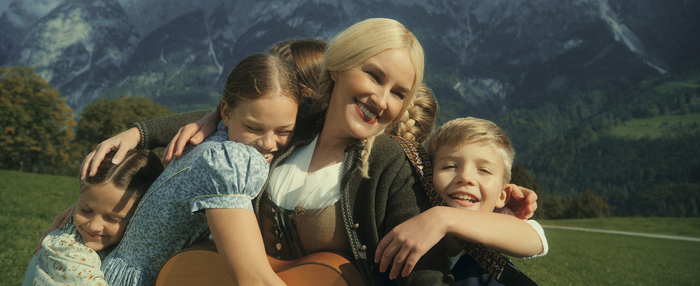
The animation of the title sequence is outstanding as well. The use of a chessboard for both seasons’ title sequences is an interesting choice. It plays with the delicacy of the show, as The Hunters sometimes had to move with caution, had to watch their every move, and had to be careful about the way in which to perform.
In Season Two, the chessboard is shown to be a map of the world and it seems to be playing with this idea that if The Hunters fail, they risk losing the entire world to this supposed new “Fourth Reich.” (For those confused on history, Nazi Germany’s reign was referred to as the Third Reich, as there were two prior “reichs” before the WWII era).
Final Thoughts on Hunters Season 2
The second and final season of Hunters is definitely some of the best television on streaming today. Season Two answered several questions from Season One that were left on the table. It wraps up our characters’ stories superbly, and the finale works in the best way. It puts everything at peace, and at least for Jonah, left it as open-ended as possible, without quite literally ending things with a “this happened to this person and they’re over it, the end.” Although, that is perhaps the most tricky part of ending certain stories, whether to fully close the door or to leave even an inch laying out. Hunters leaves just enough without tiring the trope out, while also laying enough bread crumbs for a possible permanent finale for Jonah, theoretically.
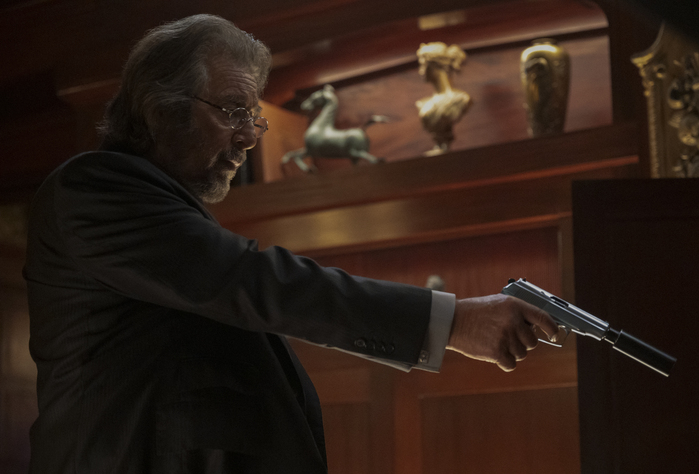
The main premise of the show — citizens of Jewish ancestors banding together to literally hunt down former Nazis that escaped justice — is compelling enough. The final season played out, perhaps, the craziest plot: to find and capture Hitler, excellently, and ended the main story at a great place. Overall, I was very satisfied with what Hunters Season Two offered. I am excited to watch the final season again when it airs on Friday.
5/5 stars for the entire show!
For my interviews with Hunters creator David Weil, and several of the cast members, along with many reviews of the year’s biggest upcoming releases, you know where to be.
Lead Critic for the site, as well as serving as an editor when needed.
This article was edited by John Tangalin.
